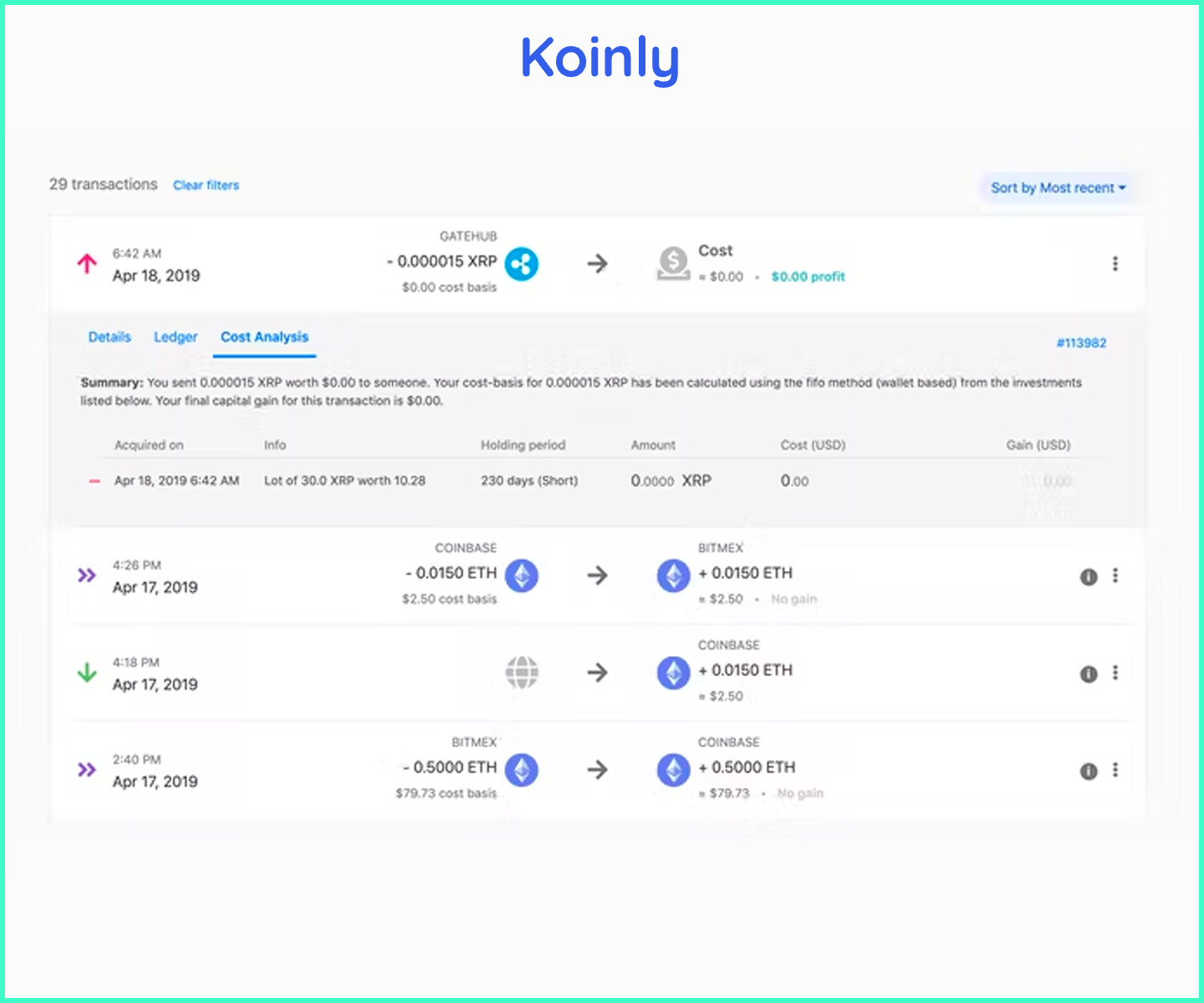These are five of the most important things every beginner needs to know about crypto taxes.
Key Takeaways
- Capital Gains tax and Income tax are the two types of crypto taxes to expect from crypto investments
- If you sell, trade, or spend crypto you’ll have to pay Capital Gains Tax
- If you earn from crypto you’ll have to pay Income Tax
- Earning from crypto comes from mining, staking, airdrops, and hard forks
- Tax free transactions include: buying crypto with fiat, moving crypto between your wallets, donating or gifting crypto
- Use crypto tax software to help you file your return
If you trade, spend, or earn from crypto you will have to pay taxes.
The US, the UK, Canada, Italy, Germany, and India view cryptocurrencies as taxable assets.
The UK views crypto assets as capital assets, therefore subject to Capital Gains tax.
The US treats cryptocurrencies as property, therefore incur Capital Gains tax.
Canada, on the other hand, views cryptocurrencies as digital assets that attract tax when sold.
Most countries that implement capital tax regulations agree that any income from cryptocurrencies should be taxed. Therefore, besides Capital Gains tax, cryptocurrencies also incur Income Tax.
You can’t legally avoid paying taxes, however there are a few exemptions.
To start us off, let’s look at the two types of crypto taxes to expect from crypto investment.
This tax guide is specially focused on US crypto investors.
Capital Gains Taxes on Crypto
A capital gains tax is tax charged on profit realized from property transfer. Because crypto is considered property in the US, as a crypto investor in the country, you incur capital gains tax any time you sell, trade, or spend crypto. However, you only owe taxes on gains realized while disposing of your crypto.
If you’ve held your cryptocurrencies for more than a year, you’ll pay a long-term capital gains tax rate, which is determined by your income. The long-term capital tax rates for the 2022 tax year indicate single filers who earn less than $40,400 per year pay no long-term capital tax.
These are the long-term capital tax rates for 2022:
| Tax Rate | Single | Head of Household | Married Filing Jointly | Married Filing Separately |
| 10% | $0 – $10,275 | $0 – $14,650 | $0 – $20,550 | $0 – $10,275 |
| 12% | $10,276 – $41,775 | $14,651 – $55,900 | $20,551 – $83,550 | $10,276 – $41,775 |
| 22% | $41,776 – $89,075 | $55,901 – $89,050 | $83,551 – $178,150 | $41,776 – $89,075 |
| 24% | $89,076 – $170,050 | $89,051 – $170,050 | $178,151 – $340,100 | $89,076 – $170,050 |
| 32% | $170,051 – $215,950 | $170,051 – $215,950 | $340,101 – $431,900 | $170,051 – $215,950 |
| 35% | $215,951 – $539,900 | $215,951 – $539,900 | $431,901 – $647,850 | $215,951 – $323,925 |
| 37% | $539,901+ | $539,901+ | $647,851+ | $323,926+ |
Source: Koinly
The long-term capital tax rates for 2022 tax year are:
| Tax Rate | Single | Head of Household | Married Filing Jointly | Married Filing Separately |
| 15% | $41,676 – $459,750 | $55,801 – $488,500 | $83,351 – $517,200 | $41,676 – $258,600 |
| 20% | $459,750+ | $488,500+ | $517,200+ | $258,600+ |
How Capital Gains Taxes are Calculated
The easiest way to calculate capital gains taxes is by using a crypto tax app. A crypto tax app does all your crypto tax calculations. It automatically synchronises between crypto exchanges and wallets, calculates capital gains and losses, and provides a final tax report that you can use to file your taxes.
Some popular crypto tax apps include CoinLedger, TokenTax, Taxbit, and Koinly.
Koinly stands out as a great crypto tax app for beginners.
Of course, instead of using a crypto tax app to calculate capital gain you could try to do it manually. If you only have a few few transactions it can be pretty straightforward but if you have any combination of earnings and trading, it’s potentially a lot to take on.
To calculate capital gains manually you’ll first have to understand what it is. A capital gain is the difference in value between when you acquired your crypto and when you disposed of it. The result can either be a capital gain or loss.
A capital gain is a profit made from selling, trading or spending your crypto.
A capital loss is a loss made from your crypto disposal.
To calculate your capital gain or loss, first, figure out your cost basis. Cost basis is how much it costs you to acquire your crypto. Your cost basis will include transaction fees.
If, unlike other crypto holders, you got your crypto assets as a gift, use the crypto-asset market value on the day you got it to know your cost basis.
Once you know your cost basis, subtract it from the value of your crypto asset when you dispose of it. Then you will know whether you have a capital gain or loss. If you have a capital gain, you’ll pay capital gains tax. If you have a loss, you won’t pay Capital Gains Tax.
Here’s an example:
In January 2021 you buy 1 Bitcoin valued at $30,000.
Your transaction fee is 2%.
Your cost basis comes to $30,600.
In April 2021, you sell your 1 Bitcoin for $62,000.
To calculate your capital gain or loss, you subtract your cost basis from your sales price.
$62,000-$30,600=$31,400.
You’ve made a capital gain of $31,400.
You’ll, therefore, have to pay capital gain tax on the amount. Now, because you held your Bitcoin for less than a year, you’ll pay the short-term capital gain tax rate, which is based on your regular Income Tax rate.
Suppose your yearly income is $80,000.
If you add $31,400 to $80,000, you are still in the 24% tax rate band. Your capital gains tax will be 24% of $31,400, which is $7,536.

Koinly
Koinly calculates crypto gains and income.
It includes staking and forks and airdrops and fees and profit and loss… all the requirements of your soon to be completed Tax Return.
Why you can trust us
I don’t have an accountant and instead I’ve used Kionly to file my past two returns.
How it works
You can share your Public Keys from all your different wallets and exchanges with Koinly and it will pull all the transaction data together. This includes cross-wallet activity. You can also upload exported .CSV files.
It’s good at highlighting any potential issues (filtering by highest gains for example), and providing general trouble shooting.
It’s not easy to sort this out crypto gains, earnings etc. but this is the best option I’ve seen. Depending on how straightforward your situation is, you might be able to handle it yourself too.
– Mark
Crypto Income Tax
Besides being taxed as capital gains, cryptocurrencies can also be taxed as income. The IRS provides a lot of guidance about when cryptocurrencies can be seen as income instead of capital gains.
Some crypto transactions that can be viewed as income and are subject to Income Tax include:
Crypto payments
If you get paid in crypto, you’ll have to pay Income Tax. If you later sell, trade, or spend the crypto funds you earned as payment, you’ll have to pay Capital Gains Tax.
Crypto mining rewards
According to the IRS, any crypto gained from crypto mining is subject to income tax. You’ll also pay Capital Gains Tax if you later sell, trade, or spend the crypto you earned through crypto mining.
Staking rewards
The IRS is yet to provide any official guidance on staking rewards and how they should be taxed. However, crypto funds earned from crypto staking are considered taxable income.
Airdrops
A crypto-airdrop involves crypto projects transferring free cryptocurrencies or tokens to participants’ wallets. If you receive a crypto airdrop, you’ll have to pay Income Tax. When you later sell, trade, or spend your airdropped crypto, you’ll have to pay Capital Gains Tax.
New coins from a hard fork
New coins gained due to a hard fork are subject to income tax. If you later sell, trade, or spend the cryptocurrencies, you’ll pay Capital Gains Tax. However, you don’t pay any tax from a soft fork as you don’t receive any new coins or tokens from the activity.
Referral bonuses
Referral bonuses are also considered taxable income. According to the IRS, disposing of referral bonuses by selling, trading, or spending them also incurs Capital Gains Tax.
The DeFi space also provides many other ways to earn crypto and incur Income Tax. Some of the ways you can earn crypto from DeFi include;
Yield farming
Yield farming involves lending crypto to lending protocols or staking crypto to Proof of stake blockchains to earn more crypto. Some popular lending protocols include AAVE and Compound.
Liquidity pool returns
Liquidity pool providers provide liquidity to decentralized exchanges to earn transaction fees. The fees are considered taxable income.
Crypto dividends
Crypto dividends are profits earned from staking crypto. FTX and CoinRabbit are some platforms that pay dividends to users.
It is worth noting that the DeFi space is a new area that the IRS is yet to provide clear taxation guidelines. However, that doesn’t mean you shouldn’t pay tax.
Tax-Free Crypto Transactions
Not all crypto transactions are taxed in the US. You won’t pay tax on crypto when you;
Buy crypto with fiat
You will not be taxed when you buy crypto with fiat currency like USD. However, you will pay Capital Gains tax for buying crypto with another crypto or Stablecoin.
Hodl crypto
Hodling means holding on to your crypto for a long time. You don’t have to pay taxes on crypto until you do something with it.
You’ll only pay Capital Gains tax when you decide to sell, trade, or spend your cryptocurrencies.
Moving crypto between your wallets
According to the IRS, moving crypto between your wallets is not a taxable event. You don’t need to record the activity and report it to the IRS.
Gift crypto
You can gift up to $16,000 in crypto to a person tax-free. A plus is that the receiver of the crypto gift also doesn’t have to pay any tax. However, if they choose to sell, trade, or spend the gift later, they will have to pay Capital Gains Tax.
Donate crypto
According to the IRS, you don’t have to pay tax if you donate crypto to a registered charitable organization. You can even claim charitable donations as a tax deduction.
Crypto Tax Software
Knowing what is and is not taxed in the crypto space is the easiest part. Filling out taxes forms is not. This is where crypto tax software apps and platforms come into the picture.
And luckily there are several good platforms to choose from:
Koinly
Koinly is a well-known crypto tax software platform that is great for beginners. It features a clean, easy-to-use interface and supports over 600 exchanges. It features one free plan and four subscription-based plans. The cheapest plan will cost you $49 per tax year, while the most expensive plan will set you back $279 per tax year.

CoinTracking
CoinTracking is designed to adapt to tax laws and regulations to generate financial statements. It supports over 18,800 coins and assets and features 13 tax methods and reports for more than 100 countries worldwide.
CoinLedger.io
CoinLedger is another impressive crypto tax software platform that supports over 350 exchanges. It features four user packages, with the cheapest one going for $49 per year and the most expensive at $299 per year.
Can You Avoid Paying Tax on Crypto?
Most crypto is not anonymous so you can’t easily avoid paying taxes. Unless you use Monero for everything but even then, it’s just easier for most people to sleep at night knowing that they’re not hiding anything.
And the IRS has many ways to ensure crypto investors pay their taxes.
For example:
- The KYC (Know Your Customer) checks implemented by all major crypto exchanges
- The banking information required to exchange fiat for crypto
- Records of crypto addresses crypto investors have withdrawn funds from
- 1099 forms sent to the IRS and users by crypto exchanges
The IRS has also won many cases against major crypto exchanges like Coinbase, Kraken, and Poloniex, forcing them to share customer data.
Paying crypto taxes is complicated.
So either try to get an accountant who understands crypto (good luck), or use software like Koinly to get it done.
Just do it.
Final Word
The US was among the first countries to implement crypto tax regulations. Many other countries are following suit.
As a US crypto investor you’ll have to pay Capital Gains tax when you sell, trade, or spend crypto.
If you earn from crypto you’ll have to pay Income tax. You can earn from crypto through crypto mining, staking, airdrops, hard forks, and referral bonuses.
You are not required to pay crypto taxes when you buy crypto with fiat, donate crypto, move crypto between your wallets, and gift crypto.
Even with a few tax laws in play, paying crypto tax is important.
Failure to file your crypto tax can result in a $10,000 fine.
While the IRS is trying its best to ensure crypto investors pay their taxes, it still has a long way to go to cover all the ins and outs of the crypto space. The service is yet to clearly define taxes to be paid from different ways crypto investors earn from cryptocurrencies.
Sources
Ultimate Crypto Tax Guide 2022 | Koinly
Article sources and further reading:
Cryptocurrency tax guide: A beginner’s guide to filing crypto taxes
The Ultimate Crypto Tax Guide (2022) | CoinLedger
Understanding crypto taxes | Coinbase
Cryptocurrency Taxes 2022: What You Need To Know
Cryptocurrency Taxes 2022: What You Need To Know
Cryptocurrency & Bitcoin Tax Guide (2022 Edition) | CoinTracker



